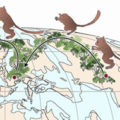
In the August issue of The American Journal of Human Genetics, Celia Greenwood and colleagues present evidence for a major genetic component to TB susceptibility. Tuberculosis (TB) is currently a major public health problem worldwide. Although there are millions of new cases of TB each year, not all individuals exposed to TB become infected, nor do all individuals infected with TB develop clinical symptoms. To date, the explanation for variability in TB susceptibility has been unclear. Genetic differences are thought to play a role, but the genes involved have not been identified. Now, Greenwood et al. have discovered a major genetic region that is associated with clinical TB. In their study, people with at least one high-risk copy of this genetic region are ten times more likely to develop TB than normal.
The population on which they performed the study, a group of aboriginal Canadians, was important in providing these definite results. Because TB was rare in Canada until the late 19th century, this group has not been exposed to TB for the many centuries that have people of European descent. In Europeans, it is believed that highly-susceptible individuals have been killed by TB over the past several centuries, leading to natural selection against this genetic susceptibility to TB. In Canada, TB has not been present long enough for natural selection to have proceeded to the same extent, and this was believed to have left the aboriginal populations with individuals at high-risk for TB.









Comments are closed.